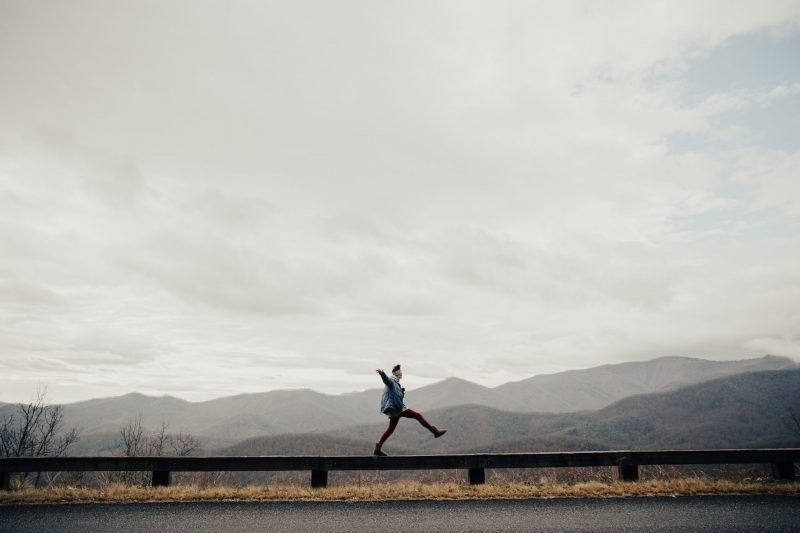Ensuring That Outdoor Activity Remains An Essential Activity in Western North Carolina
Words and photos by Rachel Veale
Spring has officially arrived in Western North Carolina – neighborhood streets are lined with blooming redbuds, cherry blossom, and magnolias, and the soft green leaves are beginning once again to fill the mountains that surround Asheville. In the midst of the uncertainty and anxiety that has overtaken the world due to the COVID-19 pandemic, it is a relief to see the soft blanket of spring unfold around us. On March 27 2020, NC Governor Roy Cooper announced a Statewide Stay At Home order for the state until April 29. Under this order, leaving your home to travel is only permitted for what is deemed as an Essential Activity – and the state of North Carolina recognizes Outdoor Activity as essential. According to the order, individuals may go to public parks and open outdoor recreation areas “provided individuals comply with Social Distancing and Mass Gatherings Requirements ” - in other words, limiting close contact with others (keeping at least 6 feet of space between you) and avoiding any convening that brings together 10 or more people in a single space at one time. Many folks are turning to outdoor spaces now more than ever as a means of combating stress and anxiety, and this should be celebrated. Countless studies have been done within the last decade showing mental and emotional benefits from spending time in green spaces. As the number of people spending time outside rises, increasing awareness of how to engage in outdoor activities responsibly and in honor of social distancing guidelines is crucial to ensuring that the outdoors can still be accessed by people and continue to serve as an effective emotional outlet. Here are a few tips on how to enjoy outdoor spaces right now in Western North Carolina, responsibly:
Stay local. Start in the sphere of your backyard/neighborhood. Avoid traveling to outdoor spaces that are outside of your immediate city – the further you travel, the more likely you are to spread / contract illness. You can receive the same mental health benefits by just being in a green space, and that green space can absolutely be a walk around your block, or a quiet morning meditation session in your backyard. Consider visiting popular places like Bent Creek or the Blue Ridge Parkway at off-peak hours (early in the morning, or just after sunset – headlamp night runs are fun!) and in the middle of the week rather than on weekends to avoid the crowds. If you can’t go outside, consider cracking a window or playing a nature soundtrack for similar mentally calming effects that occur when you hear outdoor sounds.
Be a steward of the land. Many public land entities in North Carolina are not fully staffed right now, meaning public outdoor spaces that are still open aren’t receiving regular maintenance. Most public restroom facilities are closed, so use your own bathroom before you leave home. Pack out any trash with you. Avoid using trails that are muddy, as it may be awhile before trail maintenance crews are able to do trail work. Avoid touching gates and signs.
Practice social distancing. Keep hiking/running/biking buddies to 1-2 people, maximum. Unless you’re meeting with a partner or someone you live with, strive to drive separate cars to minimize social contact. Avoid sharing food, water, and gear – and disinfect your own gear after use. Maintain a 6-foot-space of difference from all other people, being especially mindful at trailheads and parking lots. If approaching someone else on the trail, step off to allow them a 6-foot-space of passing distance.
Keep it easy. Now is not the time to chase that QOM/KOM on Strava. Don’t engage in activities that push your physical limit – our health care system has enough on its plate right now. As tempting as it may be to fly down Greens Lick on a single speed with no brakes, now is not the time. Practice conservative risk management and engage in activities that you know you can handle physically.
Respect park closures. As of March 27, 2020, all City of Asheville parks including dog parks, playgrounds, bathroom facilities, and outdoor courts are closed. However, greenways and walking trails in city parks will remain open with social distancing guidelines in place. Failure to comply with the Buncombe County Stay Home/Stay Safe declaration is punishable as a Class 2 misdemeanor.A quick reference list of the status of popular outdoor spaces in the area (**note, these opens/closures are current as of April 1 2020 and are subject to change**):
Open:
-Bent Creek Experimental Forest
-Pisgah National Forest: All bathrooms, campgrounds, picnic areas are now closed, but trails and parking areas remain open
-Blue Ridge Parkway: All bathrooms, campgrounds, picnic areas and visitors centers on the rest of the parkway are closed. 14 miles of the parkway - from milepost 455-469 - are closed.
-Nantahala National Forest - temporarily shutting down trailhead facilities and other access points to the Appalachian National Scenic Trail to prevent groups from congregating and to protect public health and safety. All recreation facilities are closed.
Closed:
-North Carolina Arboretum
-Carrier Park and French Broad River Park
-Beaver Lake
-Biltmore Estate
-Botanical Gardens at Asheville
-DuPont State Recreational Forest
-Great Smoky Mountains National Park
-Richmond Hill Park
-Appalachian Trail: The US Forest has temporarily shut down trailhead facilities and other access points in the Nantahala and Pisgah National Forests including: Max Patch, Lovers Leap and Roan Mountain/Carvers Gap in PisgahAn extensive list from the Citizen Times can be found here.
The beauty of spring unfolding in the Appalachians is a stark contrast to the uncertain, constantly shifting pandemic that has overtaken our everyday lives. Outdoor spaces now more than ever are being sought after as an outlet for our mental health and coping with emotional stress. Though much remains outside of our control right now, one thing that we can each control is how we choose to engage with outdoor spaces – and choosing to do this responsibly reflects our respect for the environment and the health of each other.
"one thing that we can each control is how we choose to engage with outdoor spaces – and choosing to do this responsibly reflects our respect for the environment and the health of each other."



